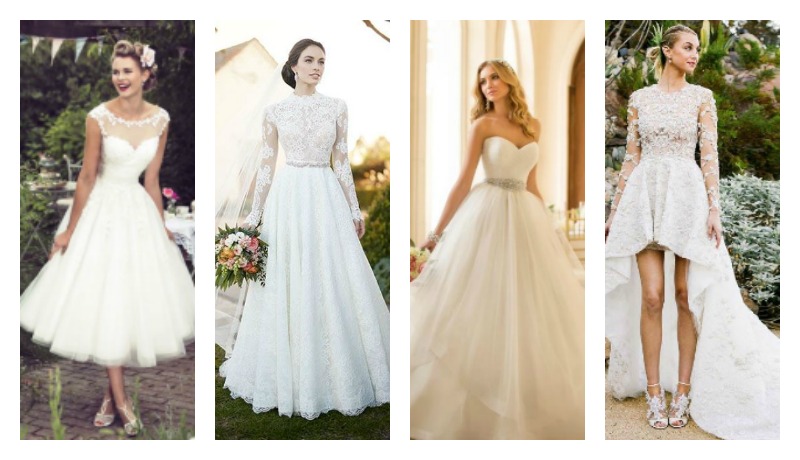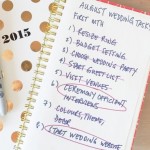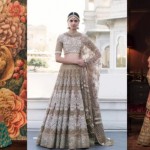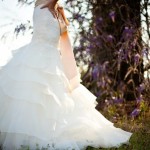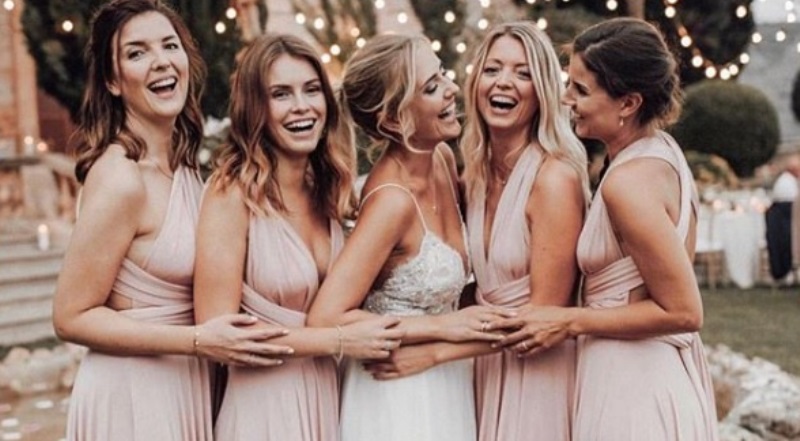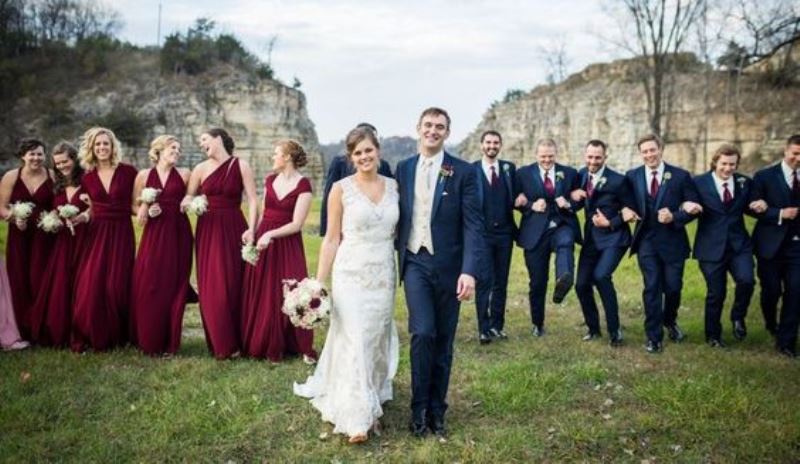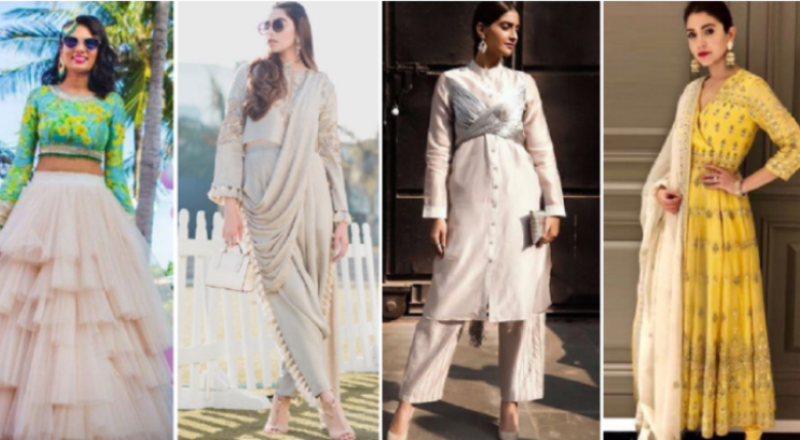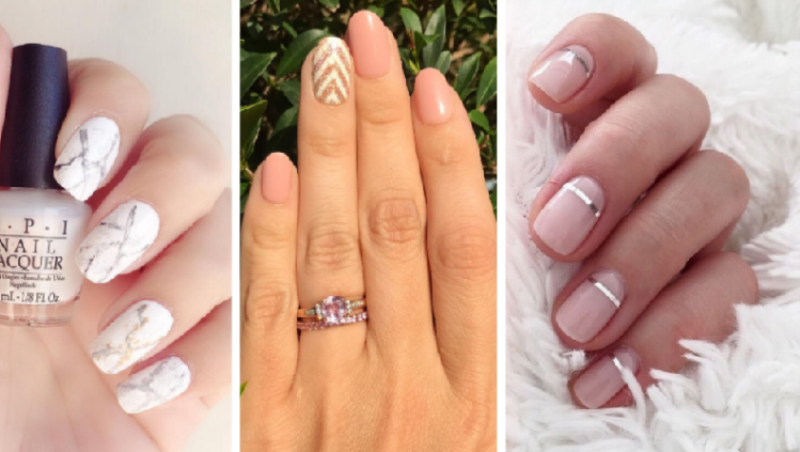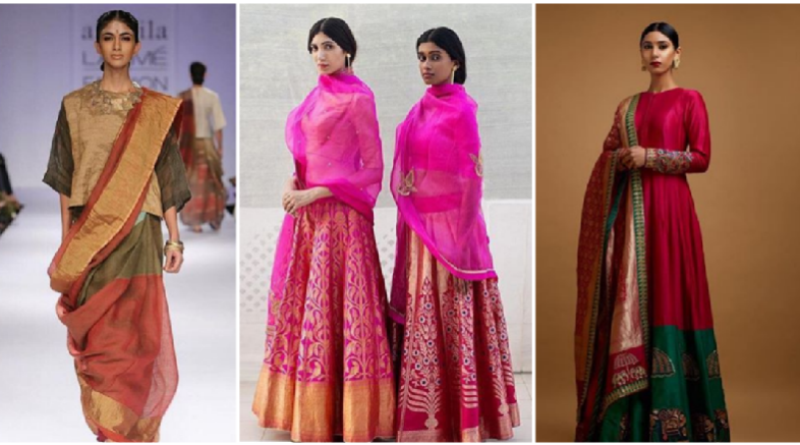For as far back as I can remember, I have been fascinated with wedding dresses. The yards and yards of silk, tulle, satin, lace, brocade, chiffon, crepe, georgette, moire, organza, polyester, taffeta, or velvet fabric, with different necklines and sleeves and drapes, with ruffles, tiers, ruching, pleats, and slits. Phew! I just love every last thing about wedding dresses.
I remember seeing my mother’s wedding dress for the first time, when I was about five years old. She had brought it out of its hallowed resting place to air it out. It was a beautiful Chantilly lace A-line creation, with Juliet sleeves and a high neckline. It was the most beautiful thing I’d seen in my short little life till then. That was the beginning of my lifetime romance with wedding dresses.
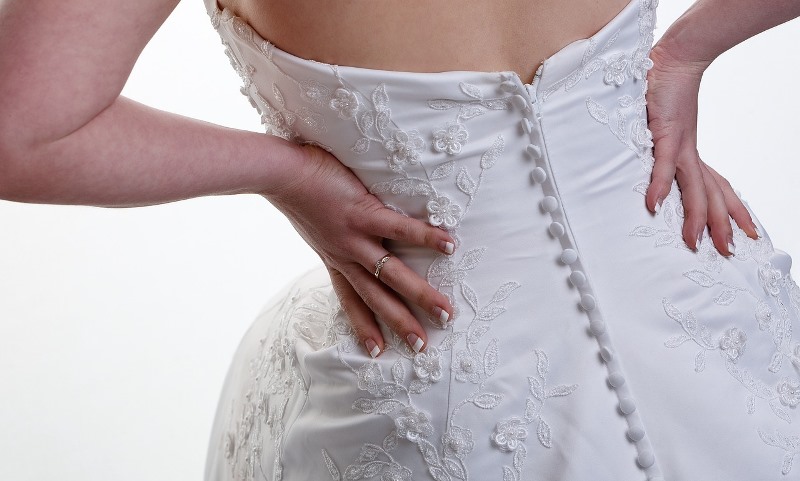
Image source: Pixabay, under Creative Commons License
It was much later, in my teen years that I learnt the myriad designs, fabrics, necklines, sleeves, trains, and silhouettes that so fascinated me when I was a kid. So I thought it was about time I put together a comprehensive list of all that I’ve learnt, that would be helpful for someone going wedding dress shopping.
Suggested read: 28 gorgeous unconventional wedding dresses perfect for a non-conforming bride
So if you’re a bride-to-be going wedding dress shopping in the near future, then you’d do well to know these terms, so that you don’t get lost in all the mumbo-jumbo spouted by the sales clerk. It doesn’t matter if you’re a girly girl who’s planning her wedding since she was six, or someone who just wants to find a dress that fits her fierce personality, you need to know these terms.
Let’s get to it!
I. Glossary: This list of terms will guide you through the following sections. These terms are commonly used in wedding dress shopping lingo.
1. Bustle
This is a poof of fabric at the back of the dress, which holds it back, so that it would ease your movement.
2. Bodice
A bodice is the upper part of a wedding dress, sans the sleeves.
3. Boning
This is the stiff insertion inside the seams of strapless wedding dresses, that prevents the bodice from gaping open.
4. Train
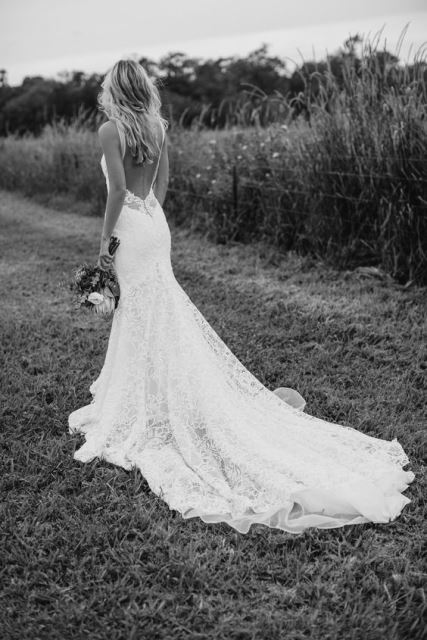
Image source: Pinterest
This is the long back part of a wedding dress, that usually trails behind you.
5. Tiers
The various layers of a skirt of some wedding dresses are what are tiers.
II. Fabrics: The various materials that are used to make the beautiful and elegant wedding dresses.
1. Brocade
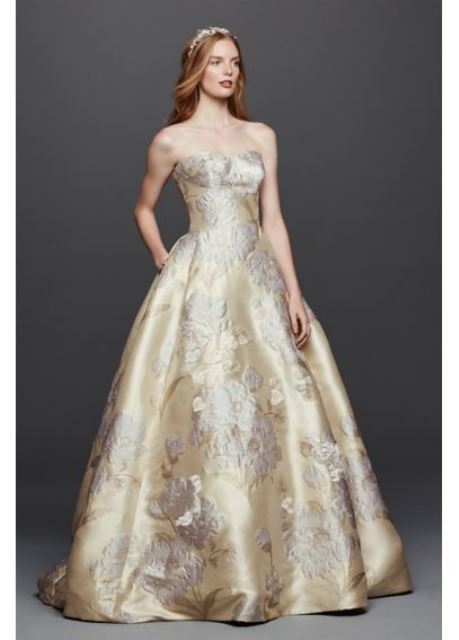
Image source: Pinterest
It’s a rich Jacquard-woven fabric that has raised patterns.
2. Charmeuse
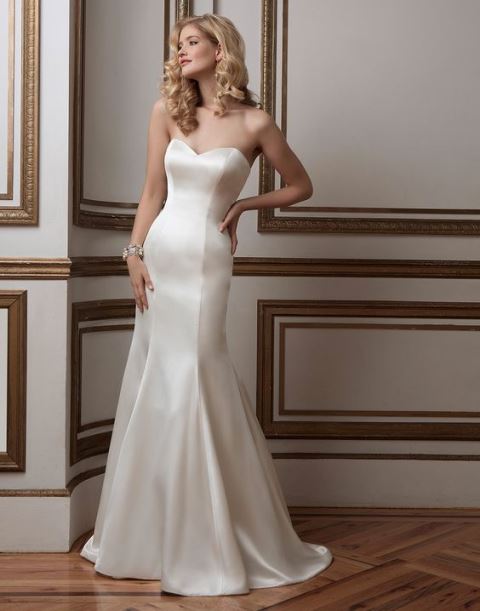
Image source: Pinterest
This is usually silk, but can also be synthetic. It’s a light yet rich fabric with a lovely drape and a semi-lustrous sheen, which feels like satin to the touch.
3. Chiffon
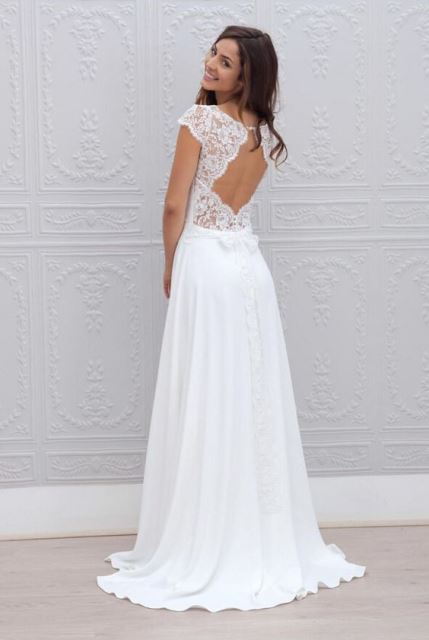
Image source: Pinterest
Sheer, delicate, lightweight, and transparent, chiffon is a light woven fabric. It’s made from silk or rayon, that is often layered. It’s popularly used for overskirts, wraps, and sheer sleeves. It drapes nicely over the body.
4. Crepe
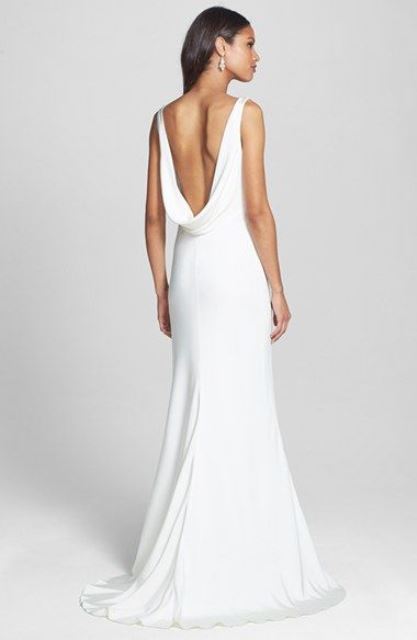
Image source: Pinterest
Crepe is identifiable with its crinkled surface. It’s again a light, soft, and thin fabric.
5. Georgette
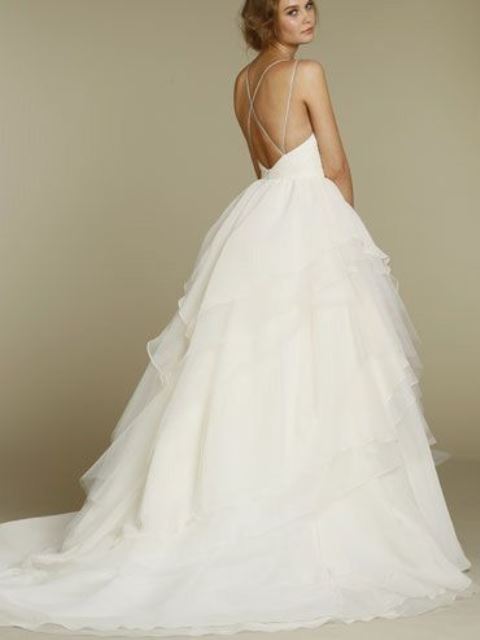
Image source: Pinterest
Often made with polyester or silk, georgette is a lightweight fabric, which is again sheer.
6. Lace
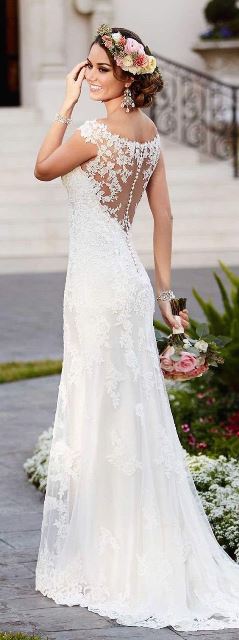
Image source: Pinterest
Lace is often used for overlays and to add other detailing on the dress. There are myriad styles of lace, most often named for the city they were originally produced. These include Chantilly, Alençon, Guipure, and Venise.
7. Moire
This has a wavy appearance, which is usually made of silk.
8. Organza
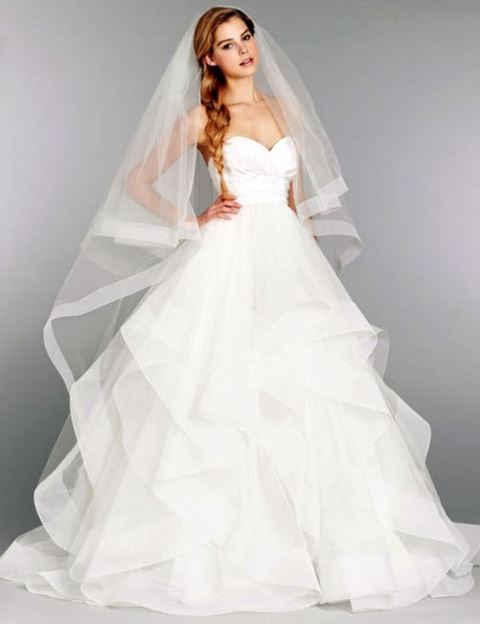
Image source: Pinterest
This is a lightweight woven fabric, which is sheer but far stiffer than chiffon. It’s popular for sleeves, overlays, backs, and skirts.
9. Satin
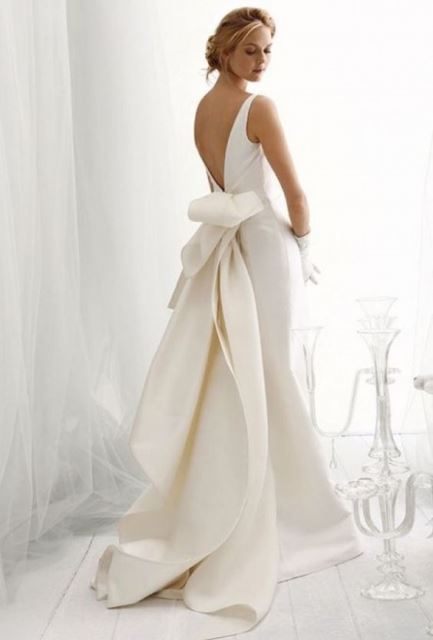
Image source: Pinterest
Made using silk, nylon, or polyester, this is a heavy fabric that has a quiet luster to it.
10. Silk
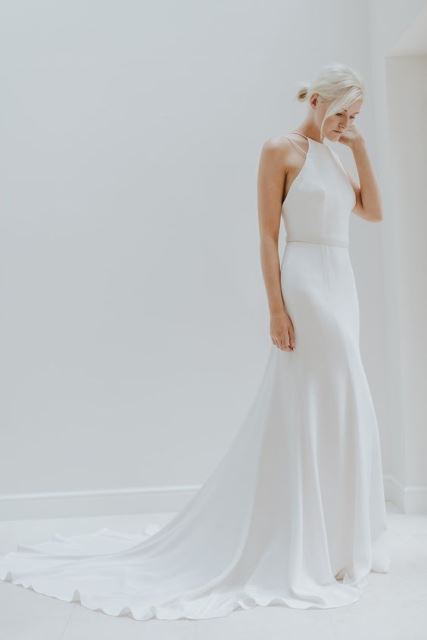
Image source: Pinterest
This is a rich and rightly expensive fabric, that comes in various different textures – raw silk and silk mikado, being two examples.
11. Taffeta
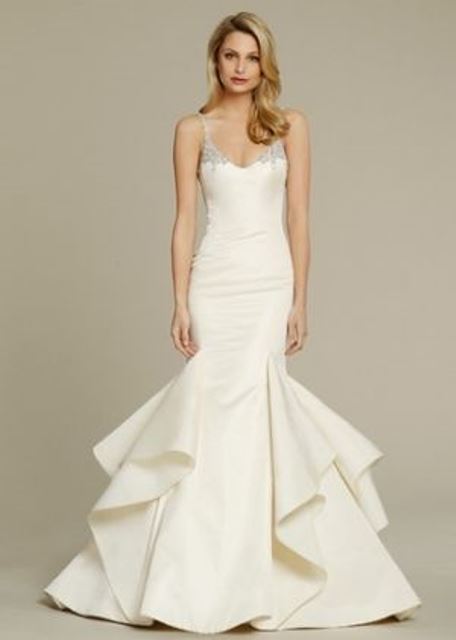
Image source: Pinterest
It is a crisp, smooth, woven fabric, usually made from silk, that has a slight rib.
12. Tulle
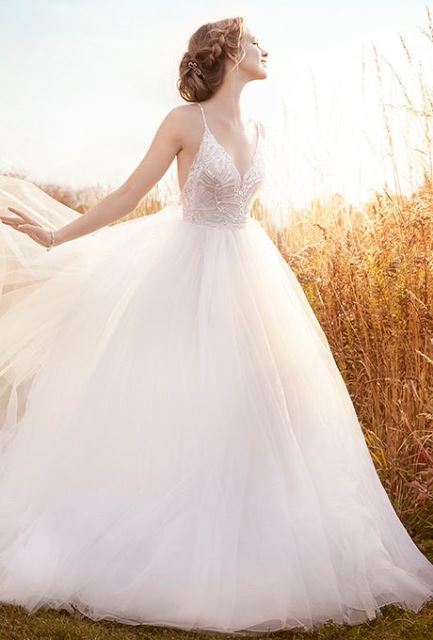
Image source: Pinterest
A light, net-like fabric that is sheer and made from silk, rayon, or nylon. This is mainly used for skirts and veils.
Suggested read: 27 lovely garden wedding ideas that will make for an unforgettable ceremony
III. Silhouettes: The basic outline of a wedding dress, how it falls on a body, where it’s cinched, where it flares out, is what is a silhouette.
1. A-line
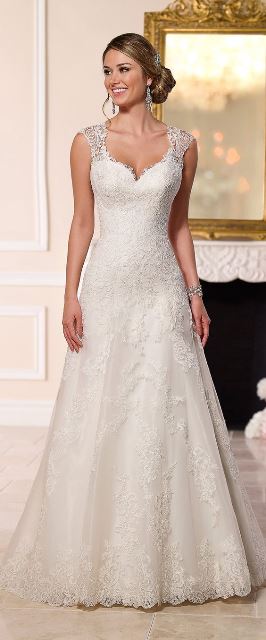
Image source: Pinterest
This silhouette literally resembles the letter A, in that the top is slim, the waist is fitten, and softly flares away from the body from the hips.
2. Ball gown
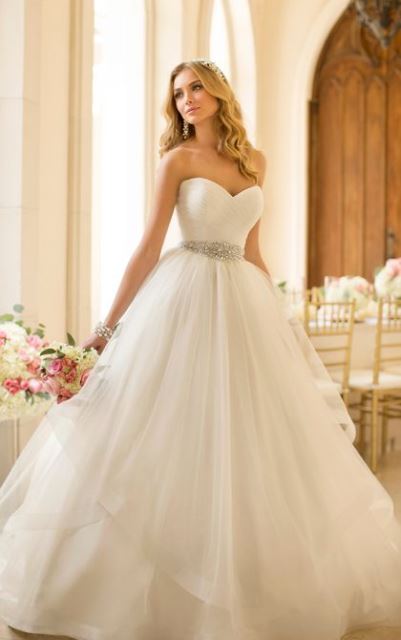
Image source: Pinterest
This features a bodice that has boning in it to keep it from drooping, since it doesn’t have sleeves, and a skirt that has various layers of petticoats.
3. Empire
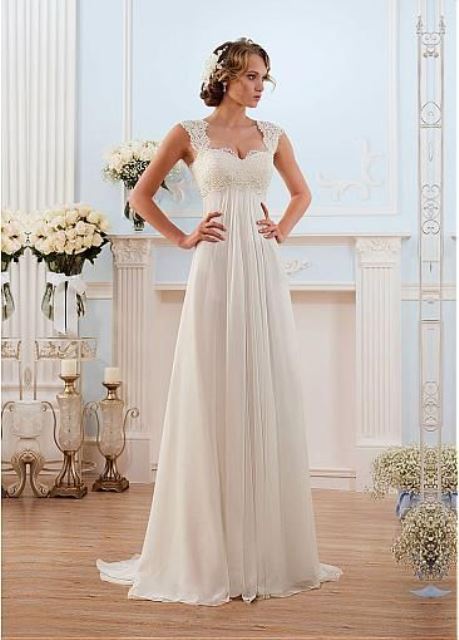
Image source: Pinterest
This features a fitted bodice that ends just below the bust. That is, is it a high-waisted style, that drapes softly down. Ideal for small-busted or curvy women.
4. Sheath
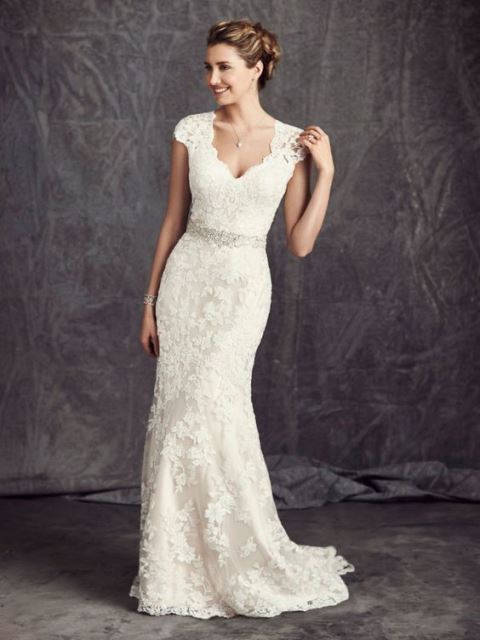
Image source: Pinterest
A sheath is a close-fitting style that hugs a woman’s curves lovingly.
5. Fit and flare or Trumpet
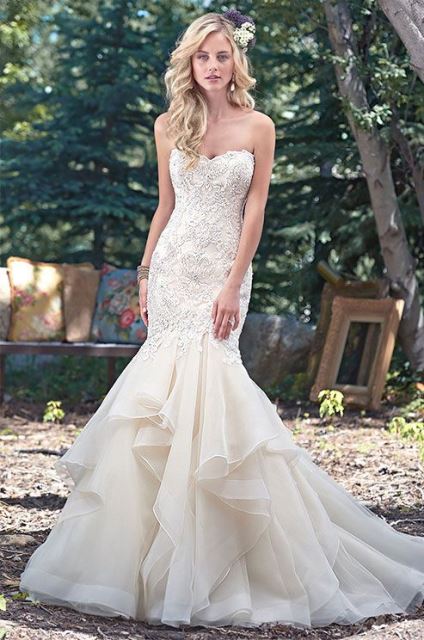
Image source: Pinterest
A fit and flare style has a fitted bodice and waist, while flaring out at the knee. Ideal for women who want to show off their curves.
6. Mermaid
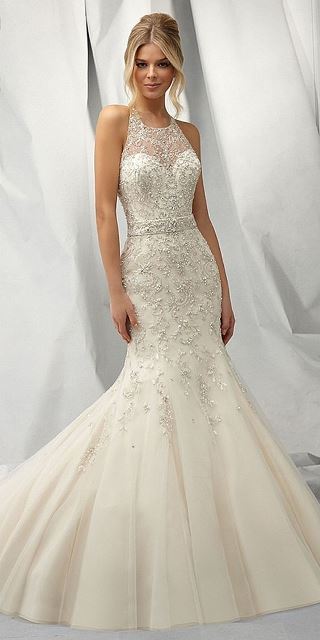
Image source: Pinterest
This silhouette is shaped like a mermaid, with a form-fitting bodice and the skirt that flares out at or just below the knee, resembling a mermaid’s tail.
IV. Necklines: The peekaboo action of the décolletage is decided by the neckline of the wedding dress.
1. Bateau
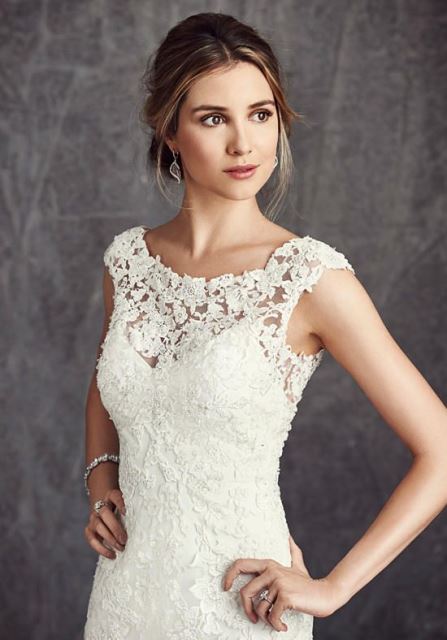
Image source: Pinterest
Bateau in French means boat. This neckline elongates the neck, by following the curve of your collarbone, almost to the tips of your shoulders. Very little of your décolletage shows.
2. Halter
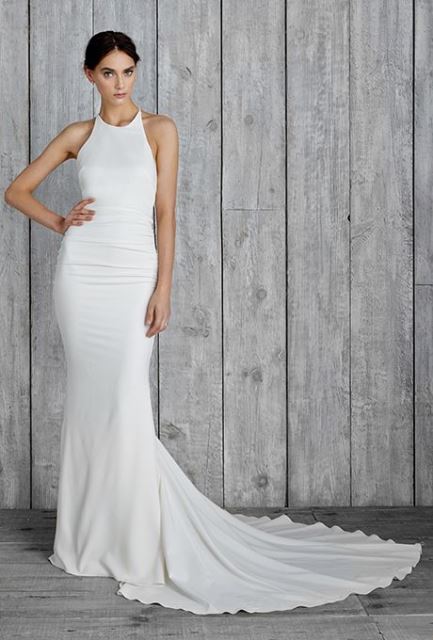
Image source: Pinterest
The straps in this neckline wrap around the back of the neck, or have a high neck with deep armhole.
3. High neck
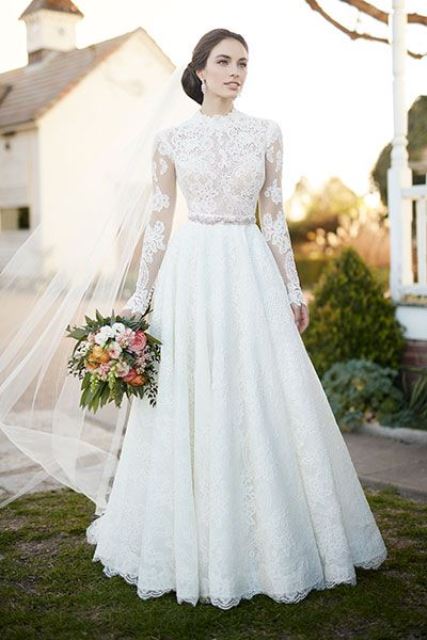
Image source: Pinterest
It comes up to the throat almost, that is perfect for taller women, or women with broad shoulders.
4. Sweetheart
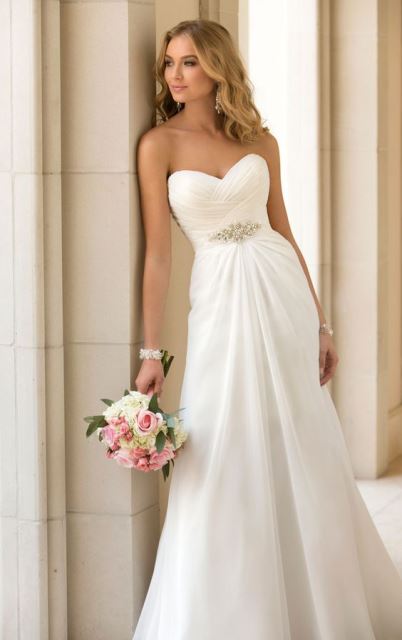
Image source: Pinterest
As the name suggests, this is a heart-shaped style that follows the outline of the breasts.
5. V-neck
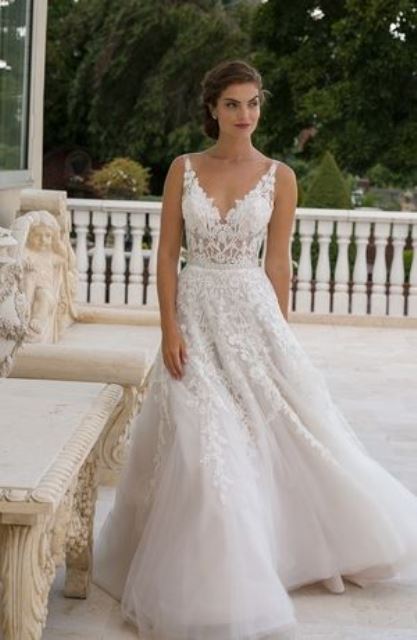
Image source: Pinterest
A v-neck lengthens the torso, making it ideal for petite or big-busted women.
6. Square

Image source: Pinterest
As the name suggests, it’s square, and the right angles help draw the eyes up.
7. Illusion
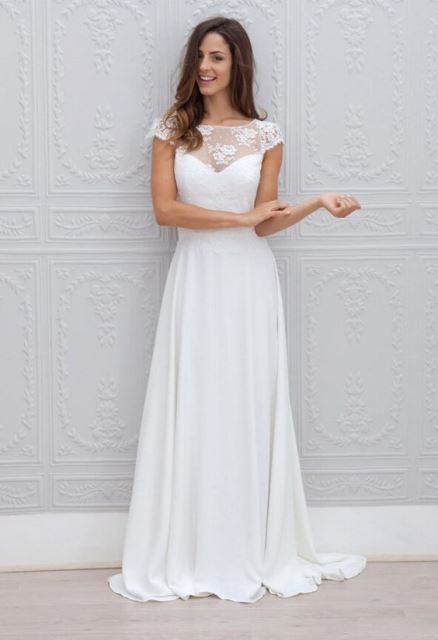
Image source: Pinterest
This consists of sheer fabric and other embellishments that cover a bride’s décolletage.
8. Scoop neck
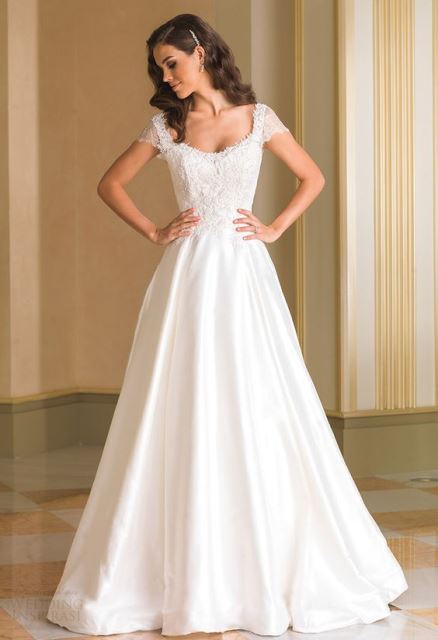
Image source: Pinterest
Unlike the square neckline, this is a U-shaped, circular neckline. It reveals the whole of the neck, while giving a peek at the bride’s décolletage.
9. Queen Anne
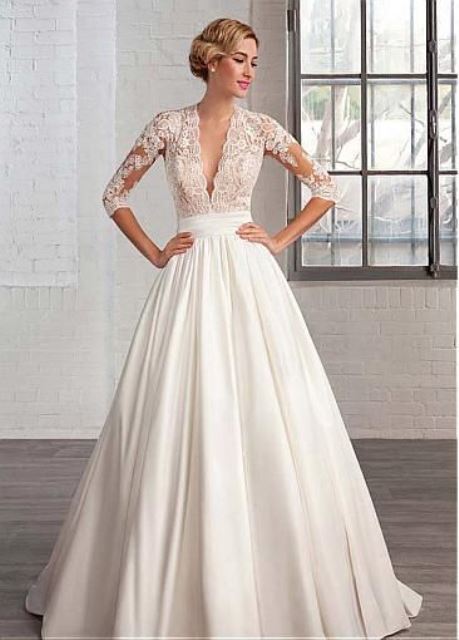
Image source: Pinterest
This is a sophisticated and very elegant neckline, that has a higher collar in the back, while the front has scoop or v-neck.
10. Strapless
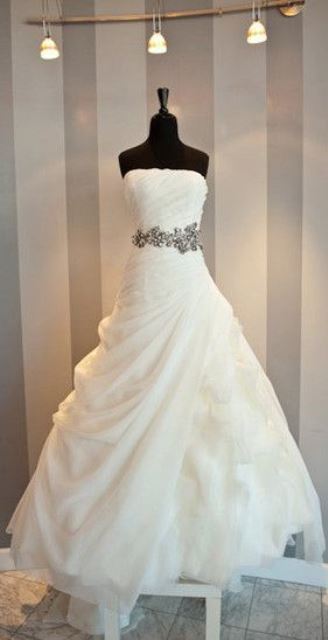
Image source: Pinterest
This neckline cuts straight across. This is a flattering style for most figures, but maybe slightly difficult for full-busted women.
11. One-shoulder
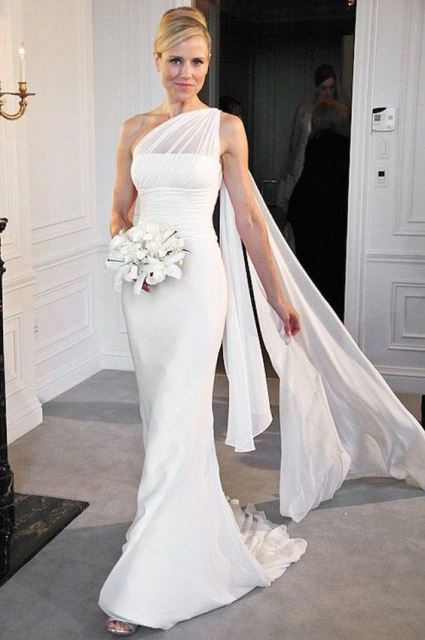
Image source: Pinterest
This one-shoulder neckline flatters small to medium-busted women, because this offer less support around the bust area.
V. Hems: The style of the skirt where the wedding dress ends.
1. Tea-length
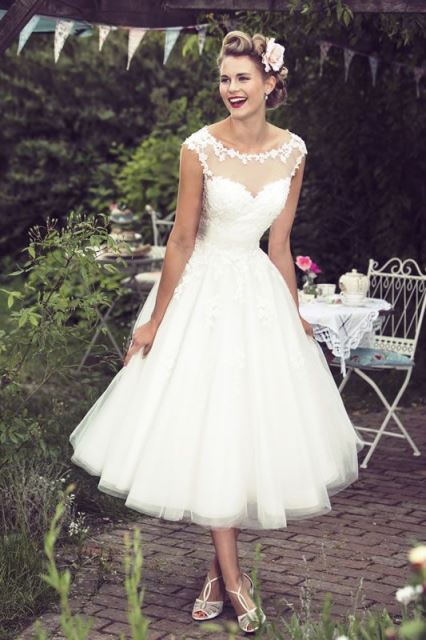
Image source: Pinterest
This hem ends just a few inches above the ankle, touching your shins.
2. High-low
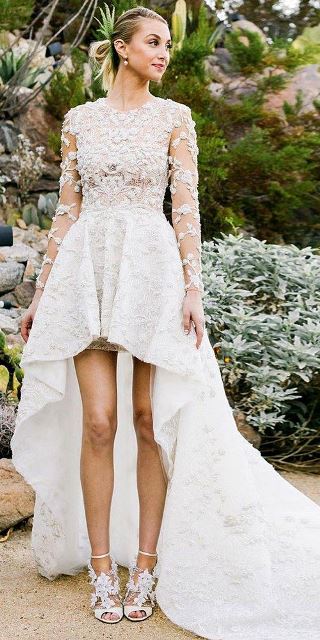
Image source: Pinterest
This is also called an asymmetrical or an intermission hem. In the front, it hits at mid-calf, while in the back, it’s floor-length.
3. Mini
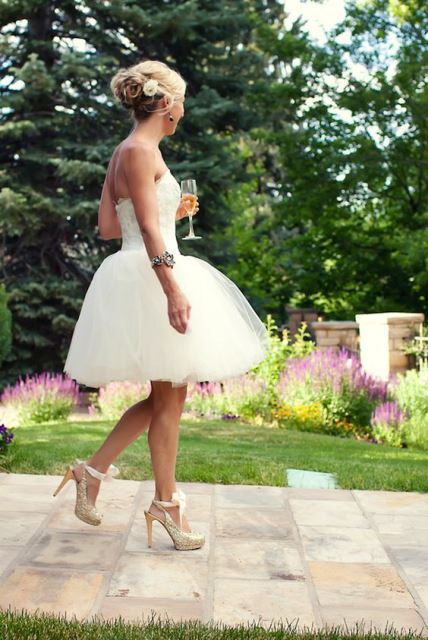
Image source: Pinterest
This one falls above the knee.
VI. Trains: The back of the wedding dress, that trails a bride as she walks by.
1. Court
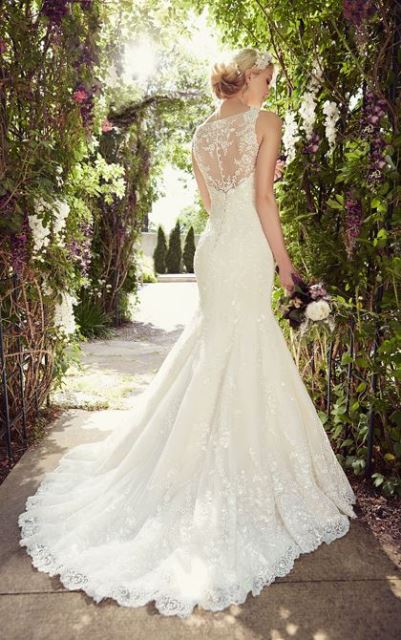
Image source: Pinterest
This train starts from the waist, while ending only about a foot behind the bride.
2. Chapel
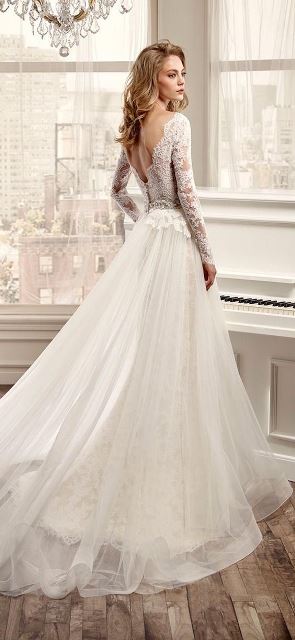
Image source: Pinterest
Falling from the waist, the chapel train trails behind the bride for about three to four feet.
3. Cathedral
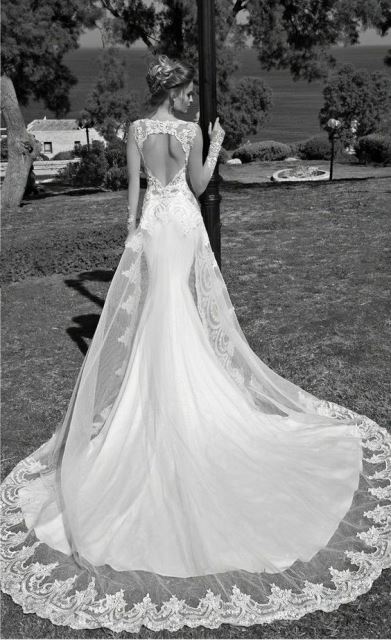
Image source: Pinterest
Longer than a chapel train, a cathedral train trails behind the bride for about six to seven feet in length, and falls from the waist.
4. Fishtail
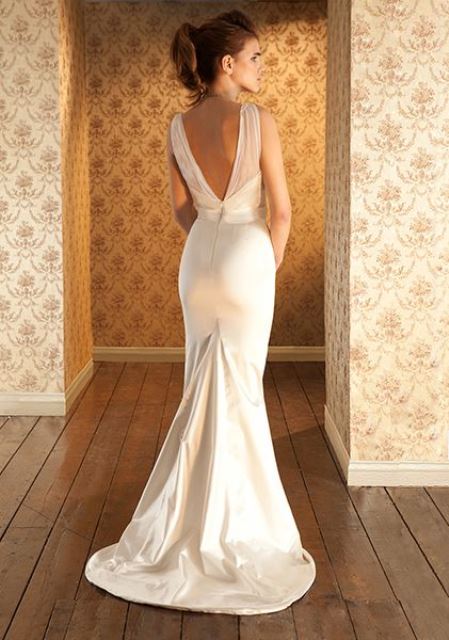
Image source: Pinterest
Usually associated with mermaid wedding gowns, the fishtail train trails behind the bride for about a foot. It seamlessly flares out from the knee.
5. Watteau
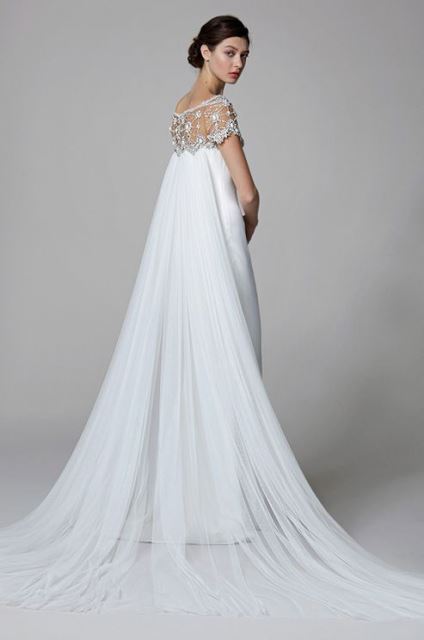
Image source: Pinterest
This is like a waterfall, that falls from the just below the shoulder blades to the floor.
VI. Embellishments: The added details to a wedding dress, that make it that much more graceful.
1. Bows
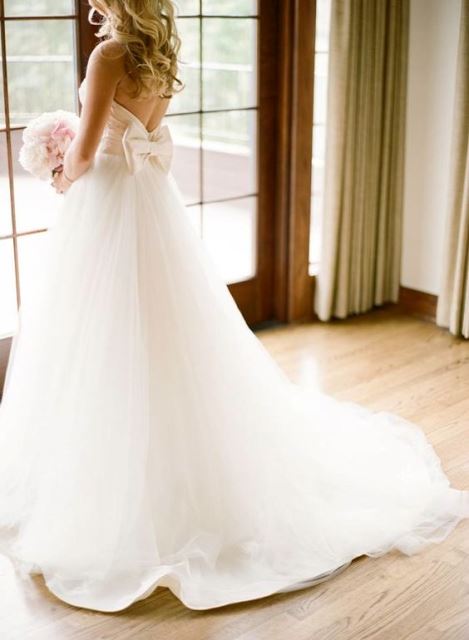
Image source: Pinterest
Placed in front or back, girly style or origami-inspired folds, bows can help accentuate a part of the bride’s figure.
2. Peplum
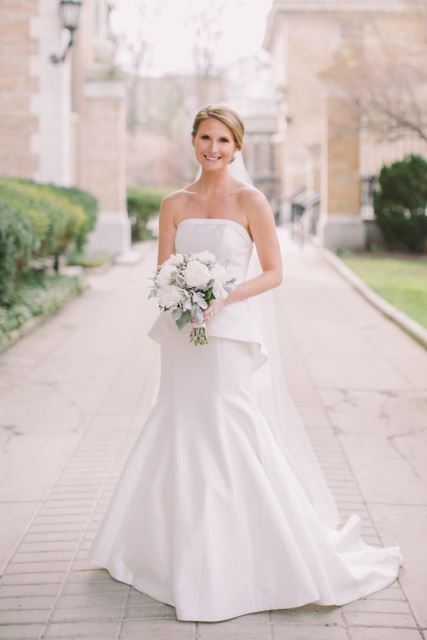
Image source: Pinterest
This is an overskirt that is attached at the gown’s natural or dropped waistline. It’s a way to add curves to a lithe woman.
3. Sequins
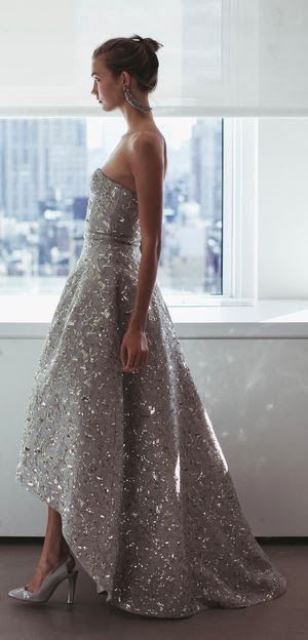
Image source: Pinterest
To add sparkle to the wedding dress, sequins – small, shiny discs, that are available in various colors as well – are sewn on to the fabric.
Suggested read: All you need to know about planning a wedding in six months
4. Crystals
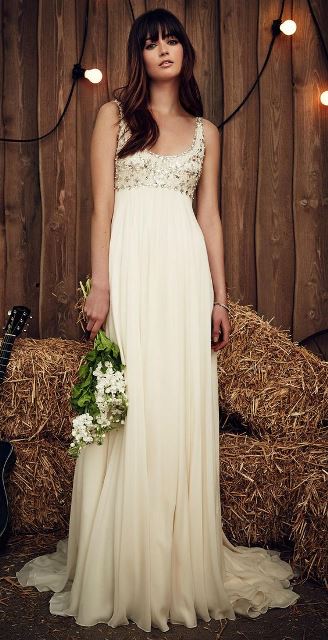
Image source: Pinterest
Larger than sequins, crystals are sewn onto the wedding dress to add lots of sparkle, thanks to their highly faceted appearance.
5. Bugle beads
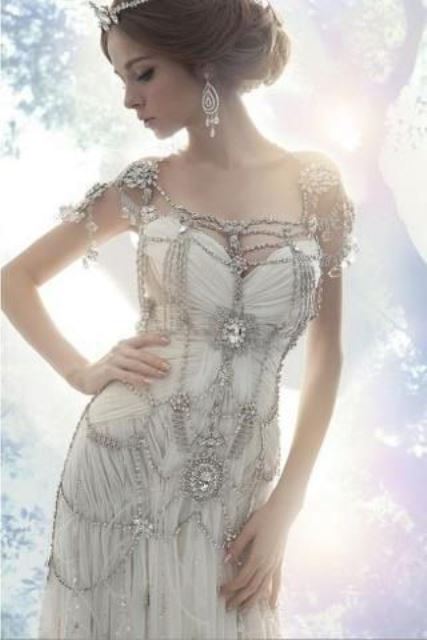
Image source: Pinterest
These are long, tube-shaped glass beads.
So there you go. All the terms you need to have at the tip of your tongue when you go wedding dress shopping. Even if your wedding is a long way off, it’s always good to improve your knowledge and wedding dress vocabulary, no?
